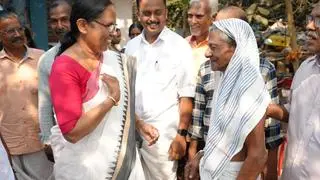Three factors define Elections 2014 in Bangalore – the Modi wave, the desire to give Nandan Nilekani a chance and voters seeing a new dawn in the Aam Admi Party (AAP).
Voters have tied high hopes with Narendra Modi (and consequently Ananth Kumar, who represents the party in the South Bangalore constituency). Speak to the vendor on the street, the small businessman, the young ones into their first jobs and the abjectly poor, and certain things become clear – the desire to consume the goodies that the mammoth malls in the IT city display, the desire for some stability in their businesses/jobs and the certainty of incomes rising to beat the rising prices. All this is pushing them to look to Modi.
The Congress, they say, has failed on these counts. Frankly, 2014 reminds one of earlier waves, such as the ones that brought Rajiv Gandhi to the helm; only the players are different this time – those who favour the BJP have their eyes on Modi, who they believe will change their lives dramatically for the better, through the party’s candidates, known or unknown.
But there is an unknown commodity in the AAP, which is giving sleepless nights to all. “AAP is the only party which is showing their sources of funds. Why can’t the others follow suit? Obviously, the big industrial houses are the ones who are funding the political parties. It is unaccounted money,” says S Ramdas, an IT sector entrepreneur.
Concurrs Vandana Rathore, employee of a private sector company. According to her, AAP has “caught the imagination” of the people, and will give a run for the money to all other candidates. But Ramdas is more circumspect; though an AAP supporter, he says it would be a surprise if AAP bags over 10 seats pan-India. He puts the chances of AAP at next to nil in Bangalore South.
One octogenarian , who requested anonymity, however said Nilekani is an unknown commodity and voting for him makes little sense.
Aadhaar factorThere is heated debate about the Aadhaar card and its good and bad aspects. The senior citizen says Aadhaar is on the lines of identification cards that exist in the West and can be useful if put to proper use. But there are others, again who requested anonymity, who say the information in the Aadhaar database can be easily misused by authorities. And the worrying fact is that there are few checks and balances at the moment.
Vandana is even more vocal about Aadhaar. She terms it a “scam”.
“When we have all kinds of databases in the country – PAN card, driving licence, phone number details with the telecom service providers, voter card and passport – where was the need to spend so much of money on yet another card?” she asks.
Nilekani’s ability to speak fluent Kannada is another point of discussion. For the man on the street, that is an important yardstick, but others like Ramdas argue to the contrary.
“Entrepreneurs like us are facing an uphill task with rising cost of capital. Prices need to come down, stability is important for growth. The Congress has not been able to achieve on this front,” says Ramdas. “Small money-based entrepreneurships are under threat due to crony capitalism.”
According to Ramdas, Nilekani, though new to politics, is no pushover .
He could well beat the others in the fray, he adds. But he has a very interesting take on the final outcome of the elections. “It is not the voters like us, the unfortunately educated ones, who matter in the final analysis. The man on the street is the one who will call the shots.”
And going by the response of the man-on-the-street, the Modi wave has them in awe. This could see Ananth Kumar romping home. The senior citizen puts the one big quality of Ananth Kumar, who has won five times in a row, to win at being an “excellent strategist”.






Comments
Comments have to be in English, and in full sentences. They cannot be abusive or personal. Please abide by our community guidelines for posting your comments.
We have migrated to a new commenting platform. If you are already a registered user of TheHindu Businessline and logged in, you may continue to engage with our articles. If you do not have an account please register and login to post comments. Users can access their older comments by logging into their accounts on Vuukle.